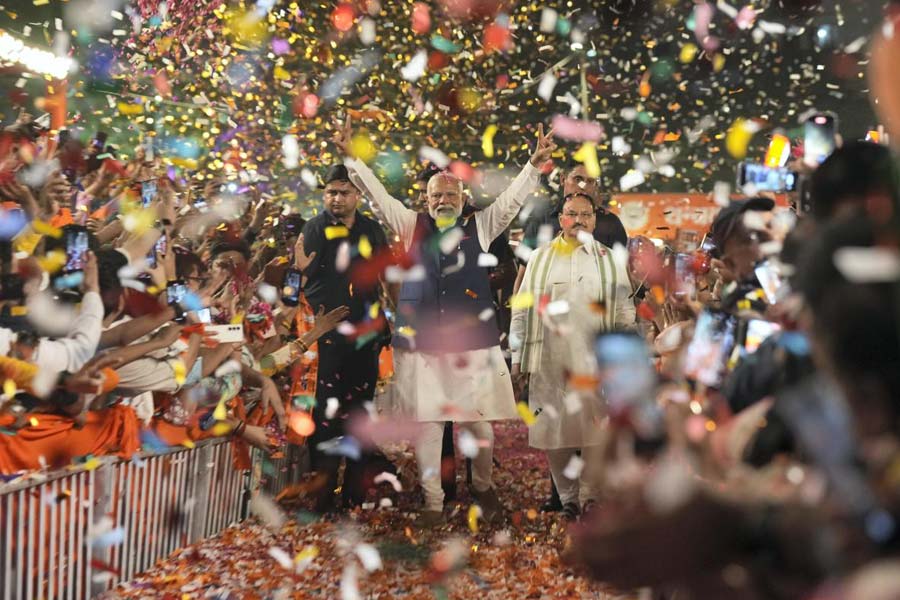The "aura of invincibility" around Prime Minister Narendra Modi has been "shattered" by the Indian voters who gave the Opposition a new lease on life, this is how the international media described the outcome of India's general elections.
According to the results for all Lok Sabha constituencies, the Bharatiya Janata Party (BJP) won 240 of the 543 seats and the Congress 99. The BJP-led National Democratic Alliance has comfortably crossed the majority mark of 272 in the 543-member Lok Sabha though the BJP lost its outright majority.
The New York Times started its report by noting, "Suddenly, the aura of invincibility around Narendra Modi has been shattered." Terming the results as "unexpectedly sobering," it noted that they were a "sharp reversal a decade into Mr Modi’s transformational tenure." For the past decade, India has been "synonymous internationally with its prime minister, Narendra Modi. But on Tuesday, as final election results poured in, the electorate appeared to show dissatisfaction with the status quo and placed the serial winner onto shaky ground," The Washington Post wrote.
There was “tepid support for his Hindu nationalist party, piercing the air of invincibility around the most dominant Indian politician in decades, it said.
"Going into this election, Modi had set a goal of winning 400 seats in the lower house of parliament, or Lok Sabha. But as results began to trickle in Tuesday night, it quickly became clear his ruling Bharatiya Janata Party wouldn’t even have enough to form a simple majority. Instead, for the first time since coming to power a decade ago, Modi will be reliant on longstanding local coalition partners to keep him in government," CNN said.
Tuesday’s result is a humbling moment for a leader whose lead in the polls was lauded by supporters as unassailable, it said.
The verdict marks a surprising revival for the Congress Party-led INDIA Opposition alliance, defying earlier predictions of its decline, and sharply diverging from both exit polls and pre-election surveys, the BBC said.
The election results show that Brand Modi has lost some of its shine, indicating that even Modi is susceptible to anti-incumbency. In other words, he is not as invincible as many of his supporters believed. This offers renewed hope to the Opposition, it said.
The results will also energise the much-criticised Congress-led Opposition, the BBC added.
“This election is undoubtedly a rebuke for Modi and the BJP,” Time magazine quoted Milan Vaishnav, the Director of the South Asia Program at Carnegie Endowment for International Peace, as saying.
“After ten years in power, it was in many ways a referendum on its track record in office and there are clearly many Indians who are feeling restless and uneasy.” Modi now faces a more powerful Opposition than at any point over the past decade, it said.
“His (PM Modi) poorer performance will have political ramifications. At a minimum, the BJP will have to depend more on the junior members of its existent multi-party alliance." The Wall Street Journal called it an election rebuke for Modi.
The election results indicated Modi had not achieved the landslide victory many had predicted, a piece in The Guardian stated.
“The Opposition alliance appeared to far outperform expectations,” the UK-based newspaper added.
CBC News said the Congress Party was given 'a new lease on life' in the election.
India’s election shows the world’s largest democracy is still a democracy, Vox Media, a US-based mass media company emphasised.
"If the basic test of whether a country remains a democracy is that the party in power can still suffer a setback at the ballot box, India passed on Tuesday. Results from the nation’s parliamentary elections — the largest in the world — indicate a shocking electoral setback for Prime Minister Narendra Modi and his Hindu nationalist Bharatiya Janata Party (BJP)," it said.
"Modi will continue to be the dominant force in Indian politics (and a significant force in global politics) for years to come, but his rise looks less inevitable and invincible than it did just a few days ago, and the world's largest democracy's politics look just a bit more democratic," it said.
In his third term, the Modi-led government might shift its focus to domestic issues, prioritising public welfare and fair distribution of growth benefits, and even adopting a softer stance on Hindu nationalism, state-run China Daily said, citing analysts.
Qian Feng, director of the research department at Tsinghua University's National Strategy Institute, said in his third term, Modi is likely to stay consistent with his foreign policy.
Qian said that the government could leverage global and regional shifts to boost India's political, economic and diplomatic strength, enhancing its international presence.
"Modi’s victory, even if diluted, is certainly not a good omen for Pakistan. Relations between the two countries hit a new low under the two previous Modi governments. It’s not surprising that the Indian prime minister had upped the ante against Pakistan on the election trail," the Dawn newspaper wrote in its editorial titled 'Weaker but still lethal'.
India should reach out to Pakistan, and the state should respond positively to any Indian overtures. Naturally, rebuilding trust will take time, but long-term peace in South Asia is impossible without better Pakistan-India ties, it noted.
"India cannot skirt around the Kashmir question; both sides should at least start talking, even if they agree to disagree. Let India’s incoming government start afresh with Pakistan," the leading Pakistani newspaper hoped.
Except for the headline, this story has not been edited by The Telegraph Online staff and has been published from a syndicated feed.










